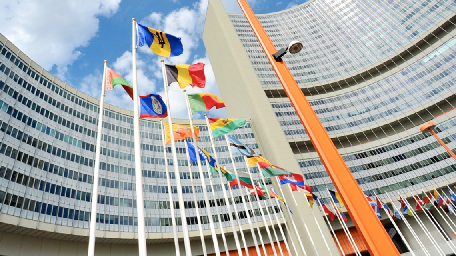What is International Atomic Energy Agency (IAEA)?
- The International Atomic Energy Agency (IAEA) is a non-governmental organization whose mission is to promote the peaceful use of nuclear energy while prohibiting its use for military purposes, such as nuclear weapons.
What is International Atomic Energy Agency (IAEA)?
- The International Atomic Energy Agency (IAEA) is a non-governmental organization whose mission is to promote the peaceful use of nuclear energy while prohibiting its use for military purposes, such as nuclear weapons.
- The IAEA is tasked with safeguarding the principles of the Nuclear Non-Proliferation Treaty of 1970 as the UN's primary nuclear watchdog.
- It was founded on July 29, 1957, at the height of the Cold War between the United States and the Soviet Union, as an autonomous organization.
- The agency reports to both the UN General Assembly and the UN Security Council, despite being founded independently of the UN under its international treaty.
IAEA History & Origins:
- The roots of the IAEA can be traced back to a speech given by former US President Dwight Eisenhower to the United Nations General Assembly in 1953.
- When the organization was initially created in 1957, the address was known as 'Atoms for Peace.'
- The IAEA is a United Nations agency with headquarters in Vienna, Austria.
- The organization's main goal was and still is to promote safe, secure, and peaceful nuclear technologies.
- There are now 171 members. Saint Lucia is the newest member, having joined the IAEA in 2019.
- India joined the organization in 1957.

- The IAEA contributes to global peace and security as well as the achievement of the Sustainable Development Goals by assuring the peaceful use of nuclear technologies (SDGs).
- Rafael Mariano Grossi is the organization's current Director-General.
- In 2005, the IAEA received the Nobel Peace Prize, along with its previous Director-General Mohamed ElBaradei.
- Despite being an independent international body, the IAEA is required to report to the United Nations General Assembly every year.
- The International Atomic Energy Agency (IAEA) includes regional offices in Geneva, New York, Toronto, and Tokyo, as well as research labs in Austria, Italy, and Monaco.
Success for IAEA: A Civil Nuclear Solution
- The IAEA is a strong advocate for civil nuclear solutions in a variety of fields, including health, which is one of the most important areas of peaceful application of nuclear technology.
- Aside from that, the IAEA has been engaged in recent years in dealing with climate change, pandemic containment, and the prevention of Zoonotic diseases.
- The International Atomic Energy Agency (IAEA) was the first to declare that North Korea's nuclear program was not peaceful.
- As a result of North Korea's decision to withdraw IAEA observers, there are no international inspectors on the ground in the country.
- Ground sensors and satellite imagery are used by the international community to monitor North Korea's nuclear activities.
India & IAEA:
- In 2012, the International Atomic Energy Agency (IAEA) authorized the nuclear power station at Rawatbhata in Rajasthan, which had sparked controversy because the plant had two incidences of nuclear material leakage earlier that year.
Iran challenge:
- The 63-year-old organization will be put to the test in the coming weeks as Iran continues to be dubious of the Biden administration's true intentions.
- The current situation will undoubtedly put the IAEA to the test, as it encompasses regional political concerns like the Saudi-Iran and Iran-Israel rivalries, as well as American interests in the region.
- It will also put the IAEA's capacity to deal with powerful states from a position of "uneven authority" to the test.
- The key point of contention on this issue is Tehran's desire for the easing of American sanctions. Iran has stated that compliance will be contingent on sanctions being lifted.
Way Forward:
- The concerns between Iran and the United States appear to fall outside of the IAEA's authority.
- Iran also wants assurances that if the deal is activated, it would not be abandoned by an American president in the future, as Trump did in 2018.
- The toughest task for all parties will be tying up all the loose ends of this complex negotiation.

Post a Comment